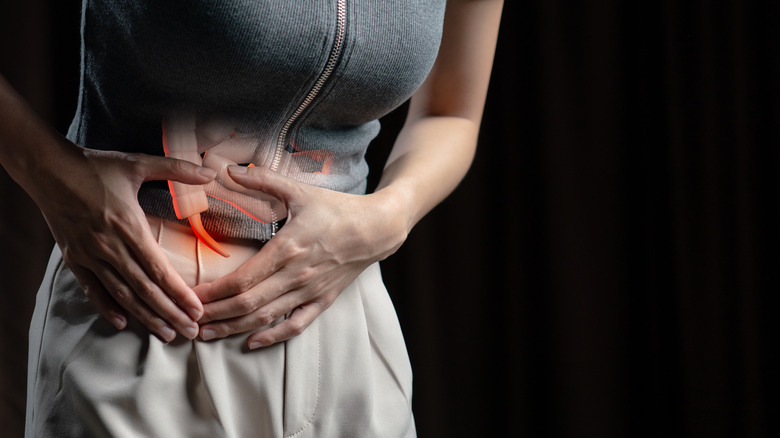Read This Before Drinking Smooth Move Tea
Smooth Move tea is an herbal tea that is often used as a natural remedy for constipation. The tea's main ingredient is senna, a medicinal herb that has been used as a laxative for hundreds of years (via Healthline). Native to Africa and India, senna works to stimulate the bowels to aid the passage of stool and alleviate constipation. As a result, Smooth Move tea is commonly used to ease bloating, promote weight loss, and relieve constipation.
Made from licorice, ginger, cinnamon, coriander, sweet orange, and bitter fennel, Smooth Move tea takes 10 to 15 minutes to steep and can ease bloating and constipation anywhere from 6 to 12 hours after drinking it. Although it is sometimes touted as a weight loss supplement, it will do very little to burn body fat. Since Smooth Move tea is a laxative tea, it will only cause you to temporarily lose water weight due to the loss of water and stools from your bowels.
The side effects of Smooth Move tea
Although Smooth Move tea is generally considered safe, it may cause some potential side effects that can ultimately defeat the purpose of drinking the tea in the first place. Some common side effects of Smooth Move tea and other laxative teas include diarrhea, stomach cramps, headaches, nausea, vomiting, and fluid losses (via Well+Good).
That's why laxative tea should only be consumed every now and then and not for an extended period of time. "If you use it for a longer period of time, your bowels can develop a dependence on laxatives for normal function," holistic nutritionist Carly Mendes told Well+Good. "You shouldn't rely on these teas as a solution. For example, people who are more prone to constipation could have an issue with the underproduction of hydrochloric acid, a necessary stomach acid that helps digest proteins."
While Smooth Move tea may be safe for short-term use, it might be a good idea to stop drinking it if you begin experiencing any of the above symptoms (via Verywell Health). You should also steer clear of the tea if you have ulcerative colitis, Crohn's disease, or appendicitis, or if you are pregnant or breastfeeding.


